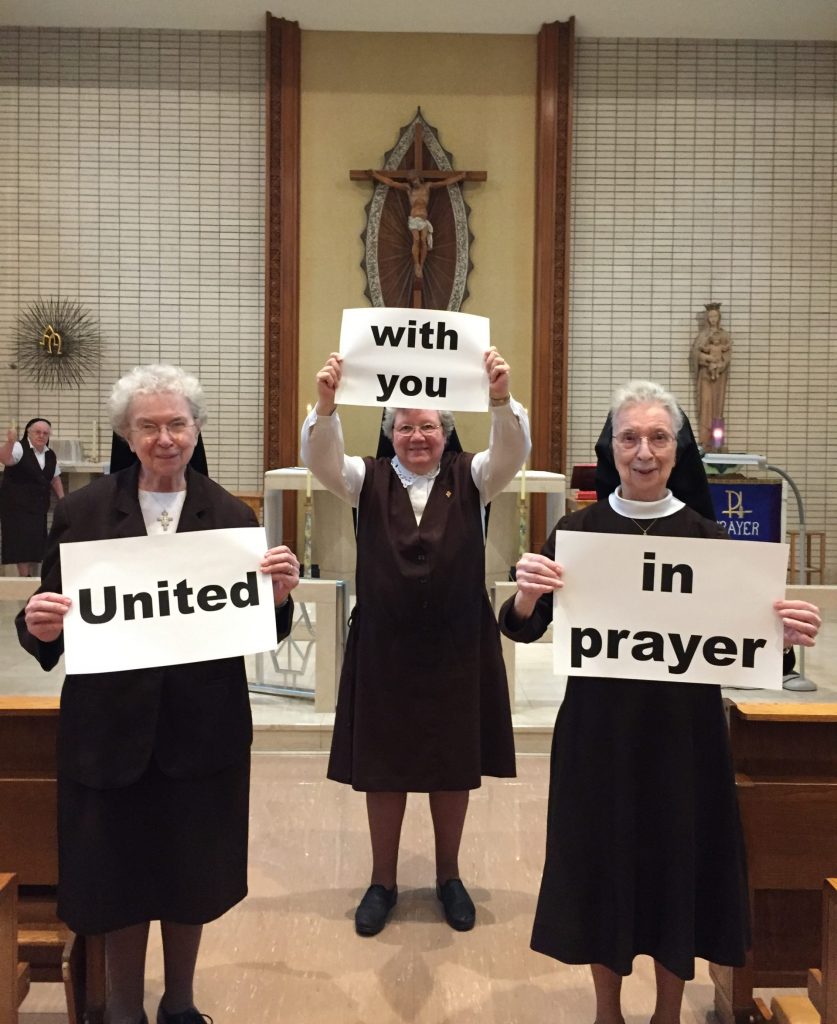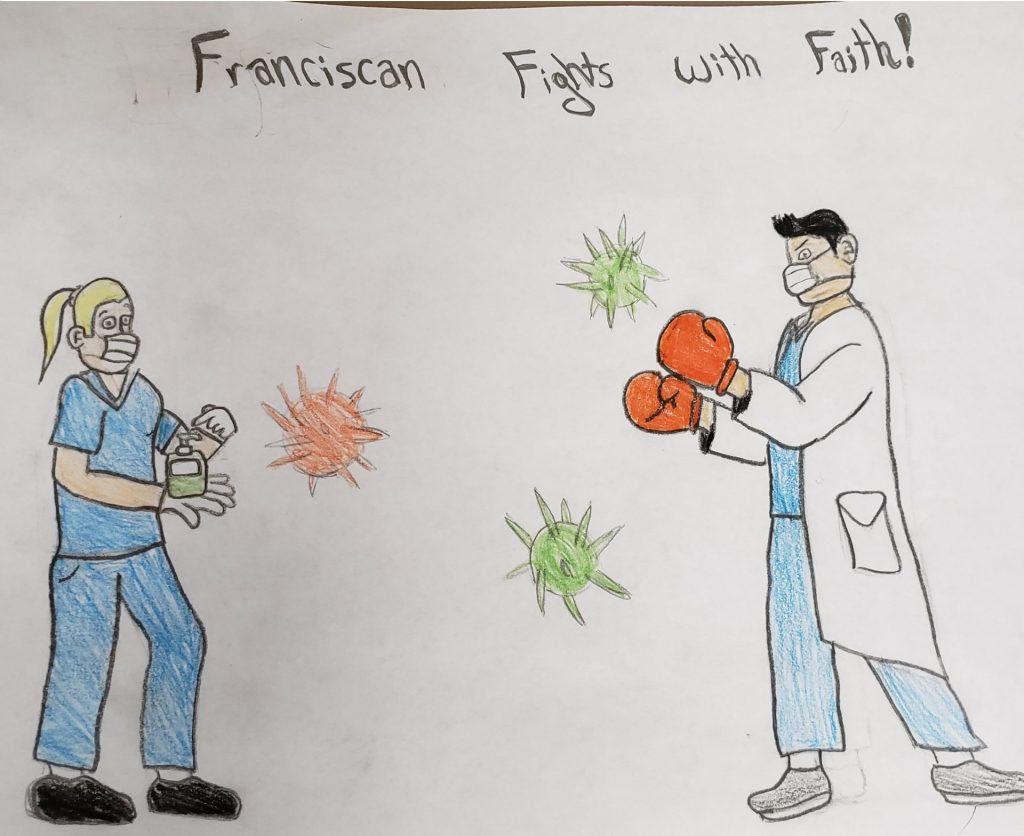August 25, 2020 // Diocese
Catholic medical personnel fortify themselves with Jesus’ exhortation: ‘Be not afraid’
Throughout the last few months, much of the world has felt captive and isolated amidst an uncertain and unpredictable future. This tumultuous time has deeply impacted the lives of medical professionals and their methods for reaching out to patients. Yet, for those who hold fast to their faith in Jesus Christ as the one who calms all storms – especially those of the mind and heart – they have found the supernatural peace to “be not afraid” and “put out into the deep.”
Dr. Robert Cassady, who practices at the South Bend Clinic and has been working directly with COVID-19 patients, shared that some of the most challenging factors of this time have been the separation and loneliness felt by family members, as well as a real fear of the unknown. Given the range of symptoms and dramatic variations in severity, he shared that “when we encounter a problem, there is typically some history or research known about the issue, but it has been difficult to try to make changes on the fly with a lack of information on what the best practices are. One of the hardest parts of this is the existential crisis of having the disease: To learn ‘I have COVID.’ We talk about it constantly, there is all this fear, and now to learn that ‘I have it. I don’t feel that sick now, but am I going to get sick in the future, am I going to be on a ventilator within a week?’ It is kind of scary.”
Dr. Cassady, a St. Matthew Cathedral parishioner, continued, “I do hope that the witness of health care personnel brings hope. Part of my understanding of my job is that there is a sacrificial component to it. This pandemic has brought out in a strong way that we can die from going to see patients, but the people need us. That’s what our job is about. We do that all the time in other ways, through the late nights and long hours that we sacrifice for patients, but with COVID, it is more dramatic.”
“There’s moments when you think that I or my family might die from this – those are very scary questions. However, there is comfort in remembering that this is not my only life, that I’m living for Christ to live eternally with God in heaven. The point of my life is not simply to stay alive; it is to serve my family and take care of my brothers and sisters. This acts as a balm against the fears and worries of this world.”

Provided by the Sisters of St. Francis of Perpetual Adoration
Sisters of St. Francis of Perpetual Adoration at the motherhouse in Mishawaka, demonstrate their support for the patients and caregivers dealing with COVID-19. In addition to operating Franciscan Health Michigan City, the sisters take the needs and concerns of the Diocese of Fort Wayne-South Bend to prayer around the clock in their perpetual adoration chapel. Those prayers are deeply appreciated by medical personnel across the diocese who are treating COVID-19 patients.
This Christian hope is also felt in deeply prayerful ways. Sister Petra of the Sisters of St. Francis of Perpetual Adoration in Mishawaka serves as vice president of mission at Franciscan Health Michigan City and leads a team that provides a witness of encouragement to medical professionals and the local community. “We want to remind them that they are not in this alone, they have support — and that our sisters are praying for them 24/7 in our adoration chapel.”
Sister Petra oversees the Spiritual Care department, which ministers to patients and families through the challenges of distanced conversations, providing grief counseling when funeral numbers are restricted and reaching those on the margins, which even includes those in prison.
Sister Petra further expressed her appreciation that both Bishop Robert J. McClory of Gary and Bishop Kevin C. Rhoades have been consistently supportive and insistent that Catholic chaplains be deemed “essential personnel” as ministers of the sacraments.
She also shared that “whenever a COVID patient gets discharged, the song ‘Praise God from Whom all blessings flow,’ as recorded by one of the sisters, is played overhead. The staff cheers as the person is wheeled out to go home, often in tears and celebration, giving thanks for the gift of God, working through the staff, bringing graces to the patient.”

The son of a nurse at Franciscan Health Michigan City, a hospital at which the Sisters of St. Francis of Perpetual Adoration serve, recently drew his interpretation of the sister’s ministry during the COVID-19 pandemic.
In addition to meeting the physical needs of patients, there is also a tremendous need for psychological and emotional support during this time. Valerie Galbraith, a licensed mental health counselor contracted with the Cottage at 933 in South Bend, shared that this has been an extraordinarily busy time for therapists.
Galbraith, a parishioner of St. Joseph, Mishawaka, shared that she has seen the highest levels of fear and anxiety with clients that don’t have a faith background or community.
“The awareness that there is a God, that He is all-powerful, and having a tangible community of faith – even if it isn’t gathering in the usual way – helps people feel less isolated and alone. Most of the people who are actively practicing their faith bring God into session. Even if we are not actively praying together, there are ways to discuss God and our relationship with Him.” She added she has often suggested that her clients pray through the Litany of Trust, which has been healing for many.
Michelle Roy, a nurse at Memorial Hospital, South Bend, who works with women and children in post-partum, also discussed the role of trusting God as she serves her patients.
“At the beginning, there was a deep-seated fear because so much was unknown. However, our team didn’t have the option to stay home. So, in the first week or two, I had to come to terms with that fear and let it go in order to be present to my patients. This allowed me to be open to God’s will. If the worst-case scenario would happen – if I were to get sick – it would be out of my control because I was doing what I was called to do. Letting go out that fear, facing it right away, and then bringing it to the foot of the cross was very freeing. It allowed me to sit with women who are going through one of the most important moments of their life and speak to them with honesty and confidence. When the women hear that they have an advocate and a team of support, a lot of their fear is taken away, too.”
The best news. Delivered to your inbox.
Subscribe to our mailing list today.






